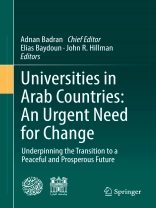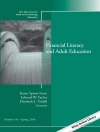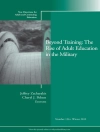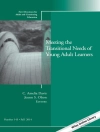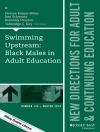This book provides an overview of the current state of universities in the Arab world, and how they have the potential to transform society to raise the quality of life and stimulate wealth. The main themes progress from general to the specific. Each chapter providing an overview followed by factual analysis and options for the way forward.
All of the major challenges facing universities in general are addressed with reference to issues of particular importance in the Arab Region. The challenges faced include: the need to accommodate a social model of life-long learning; the desire for institutional autonomy while interacting with governments; the availability of open-access online courses and distance learning.
Arab universities are diverse, ranging from those entirely state-controlled and funded, to wholly independent private universities. The quality of governmental oversight is also variable, and some institutions are clearly unworthy of the appellation ‘university’.
The book comprises of 20 chapters authored by senior academics with a wide international experience and a commitment to assisting the improvement of Arab higher educational and research communities.
Mục lục
Foreword.- Chapters.-1.Introduction.- 2. Transforming Higher Education in the Arab Region: Ways and Means.- 3. The Future of Universities in the Arab Region.- 4. Governance of Arab Universities: Why does it Matter? .- 5. Building a Knowledge Economy.- 6. Business Engagement is no longer an Optional Extra for Universities.- 7. Challenges and Constraints facing Engineering Education in Arab Countries.- 8. Higher Agricultural Education in the Arab World: Past, Present and Future.- 9. Produced but not Used: Research on the Arab World and the Lack of Social Impact.- 10. Gender Equity in Arab Universities.- 11. Online Education and Distance Learning in Arab Universities.- 12. How Should Professors Address Islam and Science Issues?.- 13. Christianity and Science: From Conflict and Divorce to Mutual Influence and Enrichment.- 14. Is Liberal Arts Education a Good Model for Arab Universities? .- 15. The Political Economy of Higher Education in Jordan: Cost-Sharing Revisited.- 16. University Reform in the Maghreb Countries: Institutional Autonomy as a Lever for National Development.- 17. Who Pays What for University Education: Context of Jordan.- 18.Reversing the Brain Drain to Provide Healthcare Education in the Arab Region: a Lebanese Model.- 19.Education City Model: Regional transformation.- 20. Higher Education in Syria: Past, Present and Future.
Giới thiệu về tác giả
Adnan Badran
Professor Badran is currently Chairman Board of Trustees University of Jordan, Chancellor University of Petra, with 120 publications, including 22 books and patents. Received BSc, at Okla. State Univ. MSc, Phd, at Mich. State Uni. Awarded honorary doctorates from, Sungkyunkwan University, Seoul; an Honorary Doctorate in Science from Michigan State University; West Watkins distinguished Lectureship Award and Hall of Fame Alumni Award from Oklahoma State University USA; Honorary Professorship from Eurasian National University Kazakhstan; Honorary Doctorate in Business, Yarmouk Uni., Jordan.
Awarded Arab Thought Foundation for best Arab Scientist in higher education research; TWAS Regional Prize for Building Scientific Institutions; Asia award for Outstanding Contribution to education.
Prof. Badran is the President Arab Academy of Sciences and AFED; President of University of Petra, Jordan (2007-2014); Former Prime Minister of Jordan (2005); Minister of Agriculture Minister of Education (1989); President of Philadelphia University (1998 – 2005); Former Deputy Director General of UNESCO (DDG/ADG) Paris (1990-1998); Founding President of Yarmouk University & Founder of the Science and Technology University Campus (JUST University), Jordan (1976-1986); Dean of the Faculty of Science at the University of Jordan (1971 – 1976).
Elias Baydoun
Dr. Baydoun was educated at the University of Jordan, Amman (BSc, 1971), the American University of Beirut (AUB) (MSc, 1977) and the University of Cambridge (MPhil, 1978 and Ph D, 1980). At present Professor of Biology at AUB and secretary general of the Arab Academy of Sciences. Previous positions include: Chairman of the Biology Department at AUB and Assistant president and Director of Planning and Development at Yarmouk University, Jordan. Awards include: The Award, of the Federation of Arab Scientific Research Councils, Abdul Hamid Shoman Prize for Young Arab Scientists for Biology, Distinguished Scholar Award of the Arab Fund for Economic and Social Development, and the Developing World Study Award of the Royal Society, UK. Membership in Societies: Cambridge Philosophical Society; Biochemical Society, London; American Society for Plant Biologists, USA;Institute of Biology, London; the Arab Academy of Sciences and TWAS. Publications: Over 50 articles in refereed international journals in addition to proceedings of international conferences and books Research Interests include: plant cell wall biosynthesis, membrane fusion, nanotechnology and medicinal plants.
John Hillman Professor Hillman, Director and Chief Executive of the Scottish Crop Research Institute (SCRI) during 1986-2005, oversaw the incorporation of the Scottish Agricultural Statistics Service (later retitled Biomathematics and Statistics Scotland – Bio SS), staff transfers from the Macaulay Institute for Soil Research, links with the University of Dundee, establishment of Mylnefield Research Services Ltd, new buildings, expansion of staff numbers, and major revision of the research portfolio. Prior to his appointment at SCRI, he was Professor and Head of the Department of Botany, University of Glasgow.
In the period 1995-1997, he was Chairman of the UK Technology Foresight Sector Panel on Agriculture, Natural Resources and Environment and then the Agriculture, Horticulture and Forestry Sector Panel. During 2000-2005, he was a member of the Board of Directors of the Bio Industry Association and chairman of its Industrial Biotechnology Group. Other positions held include President of the Agriculture and Food Section of the British Association; member of Court of the University of Abertay Dundee; visiting professorships in the Universities of Dundee, Edinburgh, and Strathclyde; editor and referee for several scientific journals; various committees of the Royal Society of Edinburgh;and member of the Scottish Funding Council Research and Knowledge Transfer Committee. He is scientific advisor to various organisations including the Arab Academy of Sciences.
